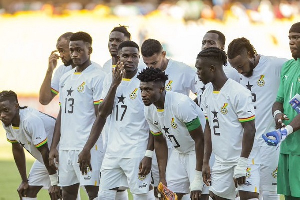In Canada where I reside, when a person of African descent is reported in the news media for having allegedly committed a crime most Whites point fingers at all people of African descent. In that case, those Whites feel that all African people in Canada (popularly called Blacks) are collectively guilty of that crime. Most of these Whites do not bother to look at the diversity of African people and the fact that the suspected criminal may have no relation with other people of African descent save similar skin pigmentation. However, when a white person is similarly reported in the news media for having committed a crime of some sort most Whites treat that person as an individual who has to bear her or his responsibility for that crime .Accordingly, the crime is an individual rather than a collective responsibility. This attitude of some Whites may be regarded as either racial stereotyping or racism.
The above is analogous to what I read on the Ghanaweb about how some Ghanaians stereotype people of Asante extraction. These writers who implicitly claimed to be highly educated have only one lens to view social phenomena: tribalism or tribal stereotyping. They never criticize the behaviour or performance of public officials without making reference to their ethnic or tribal affiliation as Asantes. And these writers use a language that explicitly makes all Asantes guilty of that behaviour or performance they deplore. Just as I deplore categorically White racism in all its forms, in the same way that I deplore tribalism in all its manifestations. This is because such behaviour does not only smack of intellectual myopism and anti-Asantesm, but also barefaced tribalism. It also fans tribal animosity and tension, making it increasingly difficult for tribal or ethnic groups to cooperate and share ideas on developmental activities. Furthermore, such an approach to social analysis clouds out the real issues the writers are addressing and makes tribalism the real issue. It has the potential to generate ugly exchanges between groups that will further polarize the country on tribal or ethnic lines. Indeed, history teaches us that ethnic polarization is one of the key factors that has ignited civil wars in some parts of the world and destroyed nation-states.
As an Asante (not Ashanti) I have absolutely no relationship with president Kufour or any of his ?Asante? ministers. I and a vast majority of Asantes are not consulted on how president Kufour or any of his ?Asante? ministers should behaviour or perform in office. Nor am I and other Asantes part of any plan or scheme to establish Asante supremacy in Ghanaian politics. Yet why should I and other Asantes bear scurrilous insults, vituperations, and insinuations from these writers, simply because we share tribal affiliation with those officials? Is that fair? The fact that an Asante is in the presidency of Ghana does not necessarily mean that I support every policies he formulates. And I can equally say the same thing for other Asantes. I will condemn any government policies or plans that tend to divide the country on tribal or ethnic lines or give one ethnic group more political or economic powers than others. I support a multicultural government in which all ethnic or tribal groups in Ghana are equally represented. I welcome any criticisms against any individual government official or citizen, regardless of the ethnic or tribal affiliation of the one who initiates them. But what I strongly despise is establishing a collective guilty for perceived bad behaviour or performance of a government official or ordinary citizen. For example, I and many Asantes are not thieves or examination cheaters. We do not posses any fake foreign academic credentials. So why would Mr. Alhaji Suli stereotype Asantes in that way?
Having said all that, I should also state that one of the blights that are destroying contemporary Ghana is the tendency to tribalize or ethnicize national issues. If any public officer is not performing his duties to one?s expectations or standards, one has the right to point that out and explain why that performance falls short of one?s expectations. That is much better and intellectually matured than to collectively condemn the ethnic or tribal background of the official. In fact, my indignation in these matters is justified on yet another note. My analysis of the social trends in Ghana shows that gradually tribal animosity is breaking down as more and more inter-tribal marriages are taking place. Now it is extremely difficult to say that one tribal group is more associated with a particular staple food. Atuosaafe, for example, is no longer the staple food of Dagombas or Gonjas. Rather it has become a national staple food. So is yokogari, that delicious combination of gari, beans, and specially made sauce. Consequently, we must condemn intellectuals/writers who try to derail our gravitation toward a unified nation-state. In fact, we have historically and anthropologically many things in common, apart from the fact that we had generally a similar colonial experience and skin pigmentation. I am yet to see any government that will capitalize on these commonalities and forge a strong national multicultural government, and initiate policies to bring about more social integration or cohesion in Ghana. Finally, I dream of a Ghana where the president and his ministers are multilingual and knowledgeable of the cultural mosaic of the country; a Ghana where all ethnic groups are represented in the cabinet and treated equally.







![Former President Akufo-Addo [L] and Okatakyie Afrifa Mensah Former President Akufo-Addo [L] and Okatakyie Afrifa Mensah](https://cdn.ghanaweb.com/imagelib/pics/587/58758132.295.jpg)











